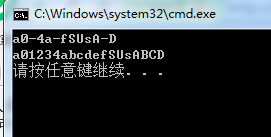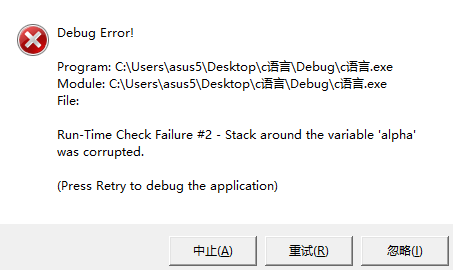70,037
社区成员
 发帖
发帖 与我相关
与我相关 我的任务
我的任务 分享
分享#include <time.h>
#include <stdlib.h>
#include <windows.h>
int main() {
int a,b[11];//本来是b[10],为判断哪句越界,故意声明为b[11]
srand((unsigned int)time(NULL));//按两次F11,等黄色右箭头指向本行时,调试、新建断点、新建数据断点,地址:&b[10],字节计数:4,确定。
while (1) {//按F5,会停在下面某句,此时a的值为10,b[10]已经被修改为对应0..4之一。
b[(a=rand()%11)]=0;
Sleep(100);
b[(a=rand()%11)]=1;
Sleep(100);
b[(a=rand()%11)]=2;
Sleep(100);
b[(a=rand()%11)]=3;
Sleep(100);
b[(a=rand()%11)]=4;
Sleep(100);
}
return 0;
}
#include <conio.h>
#include <math.h>
#include <stdio.h>
#include <string.h>
FILE *f;
int i,n,line,st;
int n1,n2,n3;
int b1,b2,b3;
int e1,e2,e3;
int w1,w2,w3;
int v1,v2,v3;
char ln[256];
char fmt[256];
char fmd[6];
char tmp[256];
char *s1,*s2,*s3,*s4;
char L,R,D;
void main(int argc,char *argv[]) {
if (argc<2) {
PMT:
printf("%s filename.ext [ParenthesesChar] [DelimiterChar]\nParenthesesChar is '(' default or '[' or '{'\nDelimiterChar is ',' default",argv[0]);
return;
}
if (argc==2) {
L='(';R=')';D=',';
} else {
switch (argv[2][0]) {
case '(':L='(';R=')';break;
case '[':L='[';R=']';break;
case '{':L='{';R='}';break;
default:goto PMT;
}
D=',';
if (argc>=4) D=argv[3][0];
}
sprintf(fmd,"%%d%c%%d",D);
if ((f=fopen(argv[1],"rt"))==NULL) {
printf("Can not open %s",argv[1]);
return;
}
line=0;
while (1) {
fgets(ln,255,f);
if (feof(f)) break;//
line++;
n=0;st=0;
for (i=0;i<(int)strlen(ln);i++) {
switch (st) {
case 0:if (ln[i]==L) st=1;break;
case 1:if (ln[i]==D) st=2;break;
case 2:if (ln[i]==R) {st=0;n++;} break;
}
}
switch (n) {
case 0:
printf("%s",ln);
break;
case 1:
s1=strchr(ln,L);
s2=strchr(s1,R);
if (s2==NULL) {
cprintf("\a\a\a missing %c in line %d",R,line);
fclose(f);
return;
}
s1[0]=0;
s1++;
s2++;
v1=sscanf(s1,fmd,&b1,&e1);
if (v1==2) {
w1=1+(int)log10((double)e1);
sprintf(fmt,"%%s%%0%1dd%%s",w1);
for (n1=b1;n1<=e1;n1++) {
printf(fmt,ln,n1,s2);
}
} else if (s1[1]==D) {
b1=s1[0];
e1=s1[2];
for (n1=b1;n1<=e1;n1++) {
printf("%s%c%s",ln,n1,s2);
}
} else {
printf("%s",ln);
}
break;
case 2:
s1=strchr(ln,L);
s2=strchr(s1,R);
if (s2==NULL) {
cprintf("\a\a\a missing %c in line %d",R,line);
fclose(f);
return;
}
s1[0]=0;
s1++;
s2++;
v1=sscanf(s1,fmd,&b1,&e1);
if (v1==2) {
w1=1+(int)log10((double)e1);
} else {
b1=s1[0];
e1=s1[2];
}
s1=strchr(s2,L);
s3=strchr(s1,R);
if (s3==NULL) {
cprintf("\a\a\a missing %c in line %d",R,line);
fclose(f);
return;
}
s1[0]=0;
s1++;
s3++;
v2=sscanf(s1,fmd,&b2,&e2);
if (v2==2) {
w2=1+(int)log10((double)e2);
} else {
b2=s1[0];
e2=s1[2];
}
strcpy(fmt,"%s");
if (v1==2) sprintf(tmp,"%%0%1dd",w1);
else strcpy(tmp,"%c");
strcat(fmt,tmp);
strcat(fmt,"%s");
if (v2==2) sprintf(tmp,"%%0%1dd",w2);
else strcpy(tmp,"%c");
strcat(fmt,tmp);
strcat(fmt,"%s");
for (n1=b1;n1<=e1;n1++) {
for (n2=b2;n2<=e2;n2++) {
printf(fmt,ln,n1,s2,n2,s3);
}
}
break;
case 3:
s1=strchr(ln,L);
s2=strchr(s1,R);
if (s2==NULL) {
cprintf("\a\a\a missing %c in line %d",R,line);
fclose(f);
return;
}
s1[0]=0;
s1++;
s2++;
v1=sscanf(s1,fmd,&b1,&e1);
if (v1==2) {
w1=1+(int)log10((double)e1);
} else {
b1=s1[0];
e1=s1[2];
}
s1=strchr(s2,L);
s3=strchr(s1,R);
if (s3==NULL) {
cprintf("\a\a\a missing %c in line %d",R,line);
fclose(f);
return;
}
s1[0]=0;
s1++;
s3++;
v2=sscanf(s1,fmd,&b2,&e2);
if (v2==2) {
w2=1+(int)log10((double)e2);
} else {
b2=s1[0];
e2=s1[2];
}
s1=strchr(s3,L);
s4=strchr(s1,R);
if (s4==NULL) {
cprintf("\a\a\a missing %c in line %d",R,line);
fclose(f);
return;
}
s1[0]=0;
s1++;
s4++;
v3=sscanf(s1,fmd,&b3,&e3);
if (v3==2) {
w3=1+(int)log10((double)e3);
} else {
b3=s1[0];
e3=s1[2];
}
sprintf(fmt,"%%s%%0%1dd%%s%%0%1dd%%s%%0%1dd%%s",w1,w2,w3);
strcpy(fmt,"%s");
if (v1==2) sprintf(tmp,"%%0%1dd",w1);
else strcpy(tmp,"%c");
strcat(fmt,tmp);
strcat(fmt,"%s");
if (v2==2) sprintf(tmp,"%%0%1dd",w2);
else strcpy(tmp,"%c");
strcat(fmt,tmp);
strcat(fmt,"%s");
if (v3==2) sprintf(tmp,"%%0%1dd",w3);
else strcpy(tmp,"%c");
strcat(fmt,tmp);
strcat(fmt,"%s");
for (n1=b1;n1<=e1;n1++) {
for (n2=b2;n2<=e2;n2++) {
for (n3=b3;n3<=e3;n3++) {
printf(fmt,ln,n1,s2,n2,s3,n3,s4);
}
}
}
break;
default:
cprintf("\a\a\a > 3 repeat in line %d",line);
fclose(f);
return;
}
}
fclose(f);
}
#include<stdio.h>
void main()
{
char alpha[100]={0},expand[100]={0};
int i=0,j=0,m;
//读入原始字符
for(i=0;(m=getchar())!='\n';i++)
alpha[i]=m;
alpha[i]='\0';
char *e = expand;
for(;j < i; j++)
{
*e++ = alpha[j];
if(alpha[j] == '-')
{
e--;
for(m = alpha[j - 1] + 1; m < alpha[j + 1]; m++){
*e++ = m;
}
}
}
*e = '\0';
/*当s1[i+1]==‘-’ && s1[i] < s1[i+2]时,
将s1[i]至s1[i+2]之间的字符展开到s2中
否则
将s1[i]原封不动的写到s2中
for(i=0;i<sizeof(alpha);i++)
{
if(alpha[i]<alpha[i+2]&&alpha[i+1]=='-')
{
for(j=0;j<alpha[i+2]-alpha[i]+1;j++)
{
expand[j]=alpha[i];
alpha[i]+=1;
}
}
else
{
expand[j++]=alpha[i];
}
}*/
//输出扩展字符
for(j=0;j<strlen(expand);j++)
printf("%c",expand[j]);
printf("\n");
}

 不好意思我是新手,请多指教,麻烦您了。
不好意思我是新手,请多指教,麻烦您了。 单步调试和设断点调试(VS IDE中编译连接通过以后,按F10或F11键单步执行,按Shift+F11退出当前函数;在某行按F9设断点后按F5执行停在该断点处。)是程序员必须掌握的技能之一。
单步调试和设断点调试(VS IDE中编译连接通过以后,按F10或F11键单步执行,按Shift+F11退出当前函数;在某行按F9设断点后按F5执行停在该断点处。)是程序员必须掌握的技能之一。
为了实现a-a将被扩展为:a-a以及扩展输入a-c-u为:abcdefghijklmnopqrstu,而B比u值小,所以无法扩展,直接输出abcdefghijklmnopqrstu-B这些情况,我加了一些,但是出现了一个警告框。
[code=c]#include<stdio.h>
#include<string.h>
int main()
{
char alpha[100]={'a'},expand[100]={'a'};
int i=0,j=0,m=0,n=0;
char*p=expand;
//读入原始字符
for(i=0;(m=getchar())!='\n';i++)
alpha[i]=m;
alpha[i]='\0';
//找出扩展字符
for(j=0;j<i;j++)
{
*p++=alpha[j];//遍历alpha数组
if(alpha[j]=='-')//如果是‘-’就输出扩展字符
{
*p--;//指针跑到‘-’前面一位
for(n=alpha[j-1]+1;n<alpha[j+1];n++)
{
*p=n;
*p++;
}
for(;alpha[j-1]>=alpha[j+1];)//当出现类似‘u-B’的情况时,这个是我加的
*p++=alpha[j++];
}
}
*p='\0';
//输出扩展字符
for(j=0;j<strlen(expand);j++)
printf("%c",expand[j]);
return 0;
}